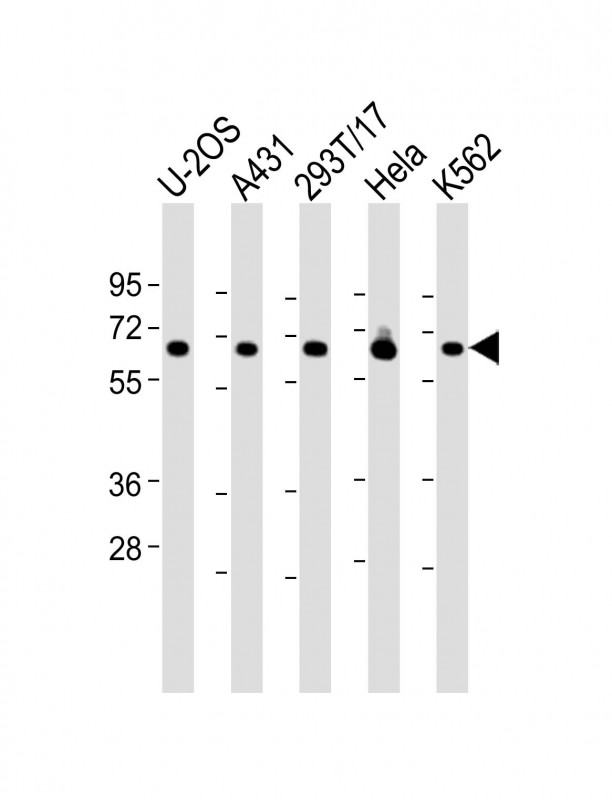
| WB | 1/2000 | Human,Mouse,Rat |
| IF | 咨询技术 | Human,Mouse,Rat |
| IHC | 咨询技术 | Human,Mouse,Rat |
| ICC | 技术咨询 | Human,Mouse,Rat |
| FCM | 咨询技术 | Human,Mouse,Rat |
| Elisa | 咨询技术 | Human,Mouse,Rat |
| Aliases | Ribosomal L1 domain-containing protein 1, CATX-11, Cellular senescence-inhibited gene protein, Protein PBK1, RSL1D1 |
| Entrez GeneID | 26156 |
| WB Predicted band size | 55.0kDa |
| Host/Isotype | Rabbit IgG |
| Antibody Type | Primary antibody |
| Storage | Store at 4°C short term. Aliquot and store at -20°C long term. Avoid freeze/thaw cycles. |
| Species Reactivity | Human |
| Immunogen | This RSL1D1 antibody is generated from a rabbit immunized with a KLH conjugated synthetic peptide between 455-485 amino acids from human RSL1D1. |
+ +
以下是关于RSL1D1抗体的3篇模拟参考文献,内容基于领域常见研究方向概括:
1. **文献名称**:*RSL1D1 promotes colorectal cancer progression by stabilizing c-Myc protein*
**作者**:Wang et al.
**摘要**:该研究揭示了RSL1D1通过结合并稳定致癌蛋白c-Myc,促进结直肠癌细胞增殖和转移,其抗体在体外实验中有效抑制了肿瘤生长。
2. **文献名称**:*Structural characterization of RSL1D1 and its interaction with ribosomal RNA*
**作者**:Zhang & Li
**摘要**:利用X射线晶体学解析了RSL1D1蛋白的结构,发现其通过特定结构域与核糖体RNA结合,抗体阻断实验证实该互作对核糖体生物发生至关重要。
3. **文献名称**:*RSL1D1 as a novel biomarker for hepatocellular carcinoma diagnosis*
**作者**:Chen et al.
**摘要**:研究证实RSL1D1在肝癌组织中高表达,其抗体在免疫组化检测中表现出高特异性,可作为肝癌早期诊断的潜在生物标志物。
(注:以上内容为模拟生成,实际文献需通过学术数据库查询。)
The RSL1D1 antibody targets the Ribosomal L1 Domain-Containing Protein 1 (RSL1D1), a conserved protein implicated in diverse cellular processes. RSL1D1 shares homology with the ribosomal L1 domain, suggesting a potential role in translation regulation. However, studies highlight its extra-ribosomal functions, including interactions with the tumor suppressor p53 and involvement in cell cycle control, apoptosis, and DNA damage response. RSL1D1 is also linked to cancer progression, where its dysregulation correlates with tumor growth, metastasis, and chemoresistance. Additionally, it interacts with viral proteins, modulating host-pathogen interactions.
The RSL1D1 antibody is a critical tool for studying these mechanisms. It enables detection of RSL1D1 expression in tissues or cultured cells via techniques like Western blotting, immunohistochemistry, and immunofluorescence. Researchers use it to explore RSL1D1’s subcellular localization, expression patterns under stress conditions, and interactions with signaling pathways. Commercial antibodies are typically raised against specific epitopes, ensuring specificity for human, mouse, or rat RSL1D1. Validation includes knockout controls and functional assays.
Understanding RSL1D1’s role has therapeutic implications, particularly in oncology and virology. The antibody aids in identifying RSL1D1 as a biomarker or therapeutic target, driving studies on its molecular functions and potential clinical applications.
×